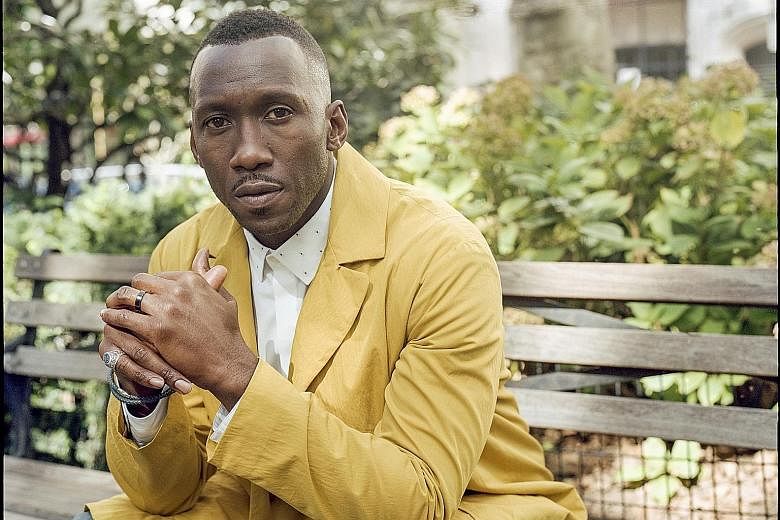NEW YORK • Over breakfast one Sunday this month, actor Mahershala Ali ordered a healthy egg- white omelette, studiously avoiding a basket of complimentary, carb- loaded pastries.
Life is full of such choices, and as he described his decision to leave the Netflix drama House Of Cards, it became clear that the career move represented a similar choice, between one immediately satisfying option and another that would ultimately be more sustaining.
"I was coming to terms with the idea that there's a difference between gratitude and fulfilment," said Ali, who earned an Emmy nomination for his bristling turn as Remy Danton, a sly political chess master. "I felt grateful for the work I was getting, but I wasn't fulfilled."
After he decided to leave the show last year, his disciplined gamble paid off immediately.
Now he is being celebrated for career-redefining roles in two prominent screen projects: Moonlight, one of this autumn's best-reviewed films, which opened in the United States last Friday; and the superhero series Marvel's Luke Cage.
Ali's rise has not been meteoric. It is the result of a hard-fought and patient two-decade campaign.
He grew up in Oakland, California, and attended St Mary's College nearby, where he was one of a few African-American students and the only varsity basketball player who also performed in poetry slams.
He discovered a love of theatre in two college plays, and after completing NYU's graduate acting programme, he landed a 19-episode run on Crossing Jordan from 2001 to 2002 as the polished Dr Trey Sanders.
"I was the black guy on the show - that was kind of it," Ali, 42, said bluntly, dapper in a crisp white cotton shirt. "It felt like there was a diversity box being checked and if you're there to check a box, to some degree, then they're not really going to write for you."
He left and became a respected stage actor (Smart People) and journeyman-supporting actor on other series (Alphas, Treme).
Crucially, director David Fincher cast him in The Curious Case Of Benjamin Button (2008), which led to roles in major projects such as The Hunger Games franchise.
House Of Cards made Ali more of a household name, but the open- ended series' commitment meant he had to reject other offers.
"I thought: I've been doing this for 16 years professionally," he said. "I have a window where I want to play leading parts."
As soon as he made his bold move to leave, he booked so much work that his deliberate career plan began to look less like a calculated game of chess than a frenzied video game. "Somehow, in the Tetris of it all, it fit together," he said.
Last year, in the span of a month, he worked seven days a week, playing four characters in four cities.
In Baltimore, he capped his run on House Of Cards. In New York, he worked on avant-garde artist Daniel Arsham's experimental film project, Future Relic, opposite actress Juliette Lewis.
In Miami, he shot Moonlight, the new film by Barry Jenkins. He spent the rest of his days in Brooklyn filming his meaty role as the nemesis Cornell Stokes, aka Cottonmouth, on Luke Cage. "To be honest, I don't intend to ever do that again," he said. "I was worried that the characters would bleed together or feel like different versions of the same character and that terrified me."
But his priority was clear.
"Moonlight is a project that resonated with me more than anything else. I wouldn't have done Luke Cage if they hadn't made time for Moonlight."
The empathetic, elegiac, low- budget film is a coming-of-age story about Chiron, a poor, gay, African- American boy from Miami, told in three segments.
In the first, Ali plays Juan, a lumbering drug dealer who discovers the trembling boy hiding from bullies. At first glance, Juan's gold front teeth and slow-moving menace project a kind of intimidating power, but Ali imbues him with an uncommon tenderness and he becomes an unlikely mentor whom Chiron later emulates.
In Moonlight, Ali's slick House Of Cards polish gives way to a simpler sincerity. He is often the only professional actor on-screen, yet his performance comes across as utterly natural, humanising a role that is often reduced to stereotype.
The film is based on an autobiographical play by Tarell Alvin McCraney. Director Jenkins said: "A friend of mine always says a black drug dealer is always only a black drug dealer, but Juan is drawn from this lived experience."
In the scenes between Juan and Chiron, he added, "you're just watching these two human beings".
Ali said that the opportunity to play the kind of African-American male mentor he rarely had in his life had brought him to tears.
"The vast majority of people in my life who made a difference have been women," he said, like the theatre professor who pushed him into acting and his grandmother, who told him "that I was handsome, that I was intelligent and that I could do anything I put my mind to".
"I didn't have one black male professor or teacher my entire life," said Ali, who is married to artist and composer Amatus Sami-Karimhe.
"For myriad reasons, there's a lack of a strong presence of African- American men to help lead some of these young men and to be role models. So many of us need a Juan in our lives at some point."
NYTIMES

